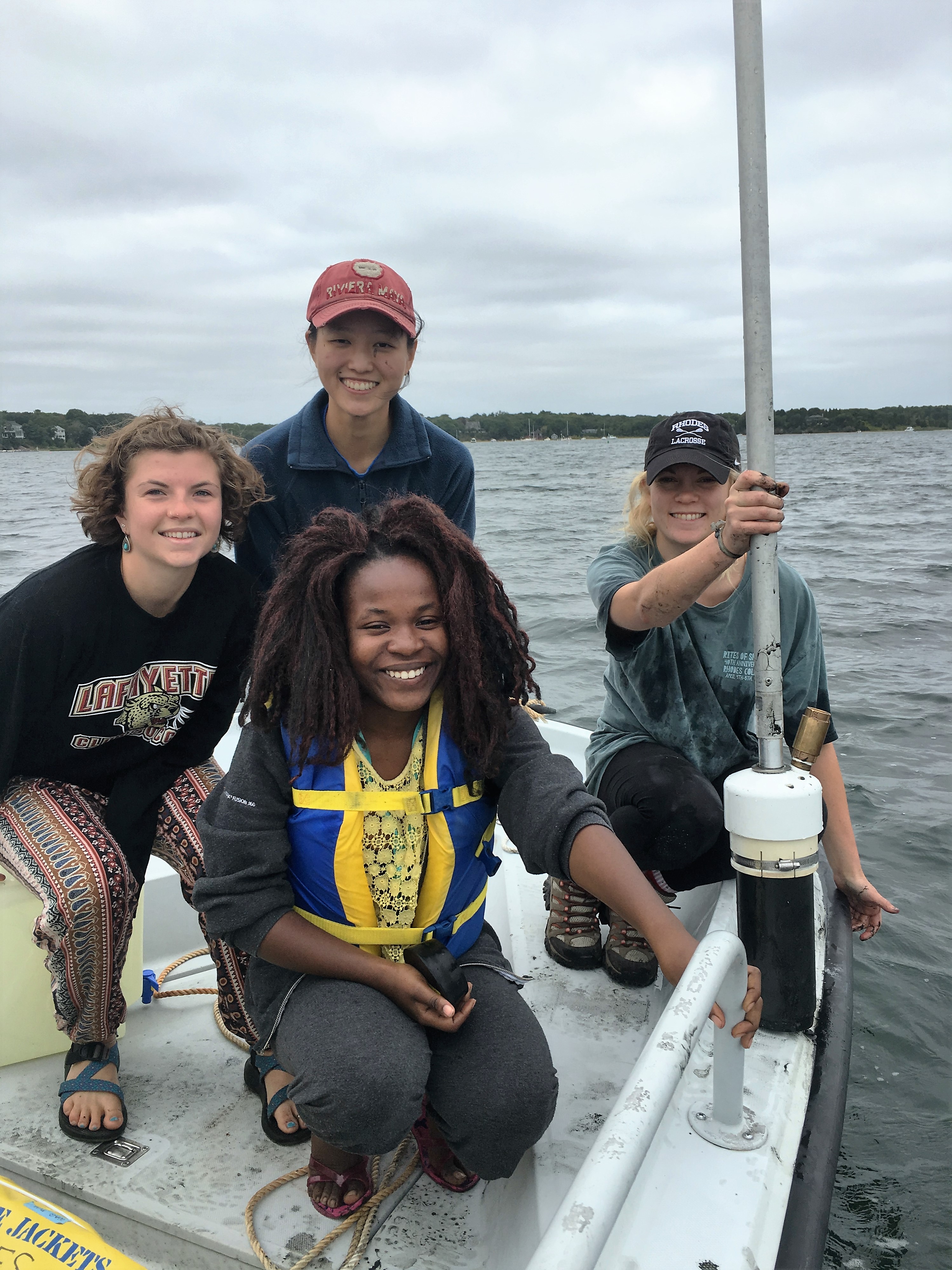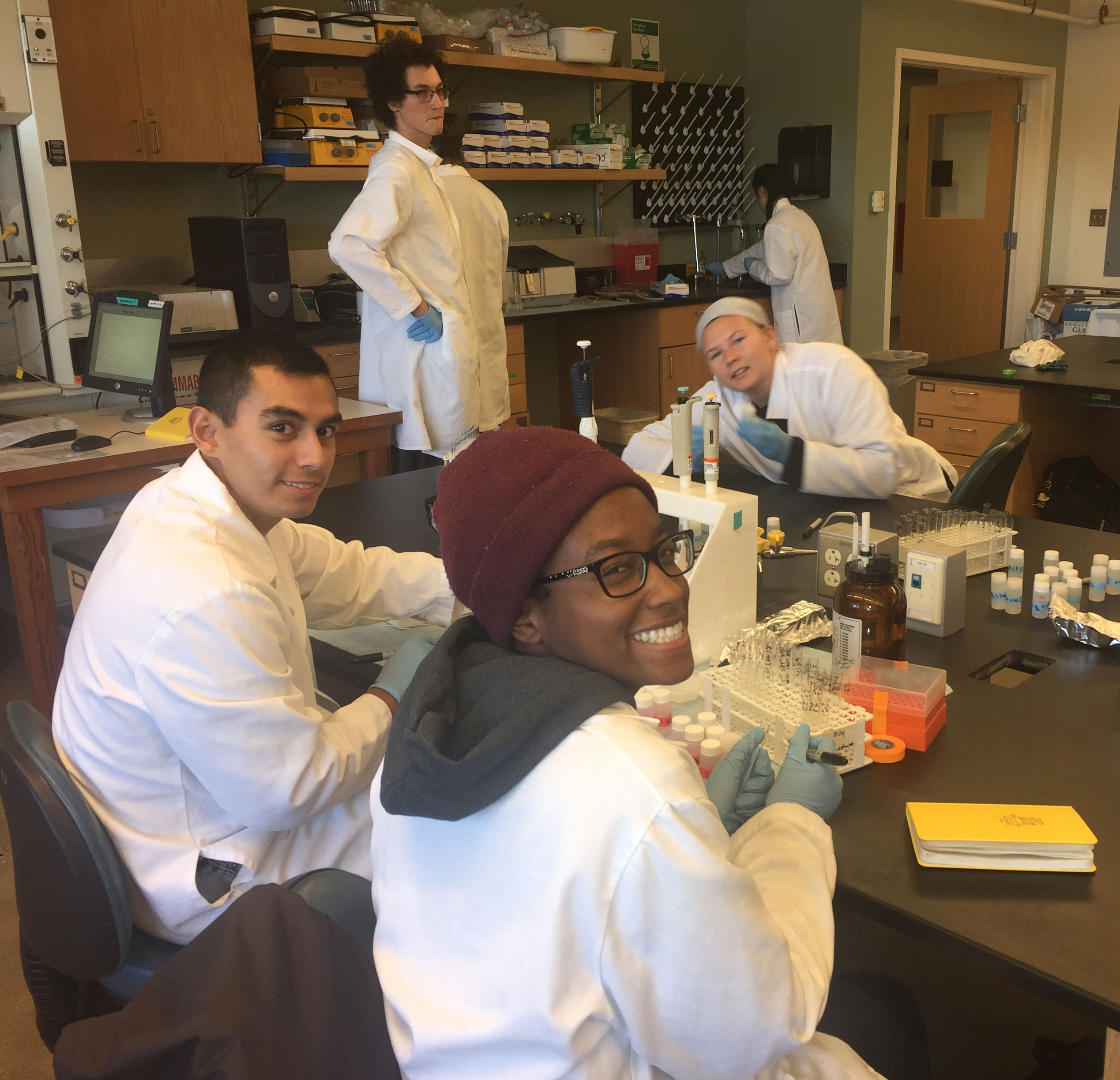MBL’s Semester in Environmental Science Expands with Two Newly Funded Initiatives

The MBL’s successful research training program for undergraduates, the Semester in Environmental Science (SES), will celebrate its quarter-century mark in 2023. Of the program’s 400 alumni, 70 percent have gone on to professional careers in environmental science, policy or management. Now, buoyed by two newly funded initiatives, SES will further expand its reach.
 Semester in Environmental Science (SES) students taking core samples in Waquoit Bay, Falmouth, in 2016. From left: Misty Earisman (Lafayette College), Hannah Gershone (Mount Holyoke College, standing), Catherine Ballali (Earlham College, kneeling) and Erin Gleeson (Rhodes College). Credit: Alison Maksym
Semester in Environmental Science (SES) students taking core samples in Waquoit Bay, Falmouth, in 2016. From left: Misty Earisman (Lafayette College), Hannah Gershone (Mount Holyoke College, standing), Catherine Ballali (Earlham College, kneeling) and Erin Gleeson (Rhodes College). Credit: Alison MaksymOne initiative, funded by the Arthur Vining Davis Foundations, seeks to strengthen the workforce in environmental science by attracting more students and faculty from minority-serving institutions (MSIs) into SES. Called “SES Break|Through,” the initiative will provide scholarship support to students at MSIs and develop a new focus within SES on environmental justice and equity. It will also support faculty from MSIs to come to the MBL to collaborate on teaching and research. This initiative will foster career training and mentoring to help launch students of color as leaders in environmental science.
The second initiative, funded by the Davis Educational Foundation, is to develop a new undergraduate semester program, complementary to SES, focused on the role of marine organisms in fundamental biological research. This program will build on the platform of more than 50 colleges around the country that have approved SES as a credit-earning, study-away option for their students. Scheduled to launch in spring 2024, the program will draw on longstanding scientific strengths in MBL’s resident faculty and facilities.
“These grants enable us to bring MBL’s world-renown expertise in intensive, hands-on research training to a much wider population of undergraduates, focusing their training on some of the most significant environmental and biomedical challenges of this century,” said MBL Burroughs Wellcome Director of Education Linda Hyman.
“It is exciting to see SES growing rapidly, building on a strong foundation to increase its impact and reach for years to come,” said Ken Foreman, director of the SES program.
Foreman is stepping down from the SES directorship in 2022 but will serve as a consultant over the next two years during the transition in leadership. Mirta Teichberg is taking the reins as director of the SES program and will carry through leadership of the Break|Through initiative. Teichberg, who received her doctorate at the MBL in 2007 through the Boston University Marine Program, arrives at MBL this September from the Leibniz Centre for Tropical Marine Research in Bremen, Germany. Welcome, Mirta!
An existing MBL faculty member will be identified to develop and lead the new undergraduate program on marine organisms in basic biological and biomedical research. As MBL’s Director of Education, Hyman serves as “dean” of the undergraduate programs.
Diversity and Leadership
Since 1997, the Semester in Environmental Science program has trained nearly 400 students from more than 60 colleges and universities, emphasizing an interdisciplinary, ecosystems-driven approach to investigating real-world environmental issues. The focus is on understanding ecosystems as a set of interacting chemical, physical and biological components, including human influences. Students complete core courses, an elective, and a science communication seminar, followed by a five-week period of independent research.
However, only 24 underrepresented minority students have completed the SES program, and only four of these were from minority serving institutions. Nationally, environmental scientists and engineers are among the least diverse professionals in STEM. Blacks, for instance, make up 13% of the population and receive only 2.8% of the nation’s environmental science degrees.
The SES Break|Through Program will help overcome barriers to entry into the field by, first, providing funding to students at MSIs to cover the cost of tuition, room, board and travel to participate in SES.
Second, the initiative aims to attract students by incorporating a new focus on environmental justice within SES. As environmental challenges increase in the 21st century, people of color – especially those who are economically disadvantaged – are disproportionately threatened by climate change, air and water pollution, and associated health problems. The program will bring in lecturers, especially from MSIs, to address topics such as urban ecology or toxic environmental impacts on communities of color. It will also offer Diversity Fellowships to faculty from MSIs to enable them to come to the MBL and collaborate on teaching and research. These fellowships will help foster ongoing participation in SES by students from their colleges.
Finally, a critical goal of this initiative is to equip undergraduates of color with the experience, support, and peer and mentor networks needed to become leaders in environmental science. This will be pursued through a number of activities both during and after the SES program.
Marine Organisms and Biological Discovery
This new spring semester program will build on the strong foundation of SES and University of Chicago undergraduate programs at MBL to explore how marine organisms can be used to answer questions about fundamental biological processes. Since 1888, MBL has excelled in the use of marine organisms for basic research, with a legacy of distinguished discovery in fields ranging from neuroscience to cell physiology to embryological development. Today, this work continues on fundamental processes underlying aging, nerve regeneration, genetic controls on development, new ways to image cells and cell structure, and the role of the microbiome in animal health. Using the rich marine life at its doorstep, the MBL is a center for discovery of basic mechanisms of life at all levels, from genomes, cells, and tissues to organisms, populations and species. These institutional strengths will be brought to bear in the new undergraduate semester in fundamental biological research.
The MBL will develop a minimum of three new courses for this program on topics that may include The Synapse, Microbiomes, and Imaging, among others, each representing the unique strengths and faculty resources available at MBL. In addition to lectures and discussions of key literature, the program will center hands-on laboratory training using state-of-the-art equipment and foster independent student research projects – hallmarks of MBL’s successful training programs at both graduate and undergraduate levels.
Homepage photo:
Semester in Environmental Science students collecting data at Crane Wildlife Management Area in Falmouth in 2019. From left, Rich McHorney (MBL SES faculty), Kyra Madunich (Pomona College), Khashiff Miranda (University of Chicago) and Grayson Walter (University of Chicago). Credit: Lauren Johnson
—###—
The Marine Biological Laboratory (MBL) is dedicated to scientific discovery – exploring fundamental biology, understanding marine biodiversity and the environment, and informing the human condition through research and education. Founded in Woods Hole, Massachusetts in 1888, the MBL is a private, nonprofit institution and an affiliate of the University of Chicago.
